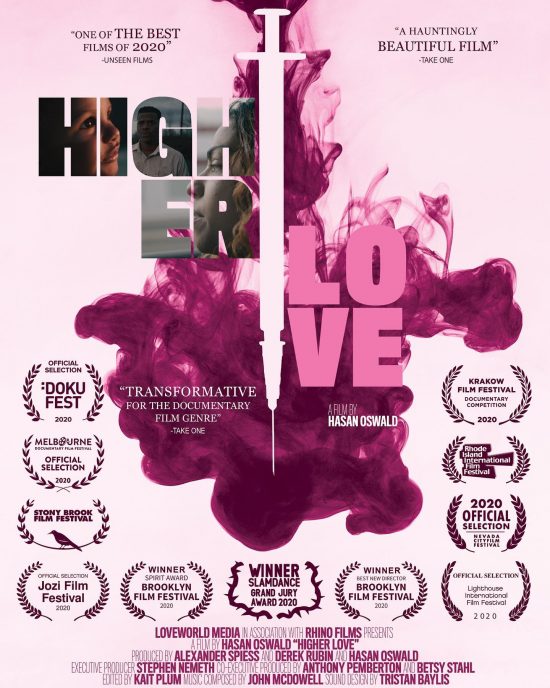Review: Higher Love
A sobering statistic at the end of director Hasan Oswald‘s debut documentary Higher Love brings context to everything that came before – during the making of the film, 200,000 Americans died from an opioid overdose. The opioid crisis in America is the focus in this new film, told from the perspective of residents in Camden, New Jersey. But Camden could really be any city, any town, a stark reminder that this problem isn’t just relegated to any one place, class or race. This epidemic can affect everyone.
Like many areas in the U.S., Camden was once a promising blue-collar town, now a victim to the death of industry when its main manufacturing facility closed down. Camden is currently described as one of the “murder capitals” of America, crime and drug use now familiar to its streets. Driving on those streets is Daryl Gant looking desperately for his girlfriend Nani, who is pregnant with their child. And this isn’t a one-time thing. Nani has a group of people she regularly lives with, namely Nikki and Iman, himself a drug dealer, who provide access and an environment in which to shoot up heroin and smoke crack. To Daryl, who is consistently worried about his unborn child, it has never been more important to try and get Nani out of the grasps of addiction, but she just cannot see a way out.
The film mostly follows Daryl and Nani’s story, through the birth of their child (who seems to be born without concerns despite his mother’s drug use) and beyond. It is heartbreaking to see Daryl try and help Nani, a woman whom he clearly loves but who is constantly pulled away from family by the substances she abuses. Indeed Nani and Nikki even converse about their admitted downfall and self-destruction due to drugs, but also about their inability to get better. Nani isn’t ready to go to rehab, even though she knows life with Daryl and her son could be better. It’s difficult to watch as she places needle after needle in her arm.
Oswald does not shy away from showing explicit use of these drugs. Instead, he points his camera in places that would make others look away. The subjects of this documentary are people we often see fictionalized, but less commonly see depicted on screen in real life. They are people whom society does look away from, tends to forget, and provides little assistance for. Higher Love doesn’t necessarily provide any answers, but then there aren’t any easy ones, even for those individuals that want to try and break the cycle.
Iman, a former engineer who developed an addiction while dealing drugs, tries to outrun the epidemic by moving to different towns only to find drugs everywhere. They are inescapable. Iman checks himself into a detox facility, something his father, himself an addict for decades, now recovering, applauds. But his father also is not convinced of Iman having success. To him, it all seems sadly futile, highlighting the problem that this is also a generational issue. Breaking the cycle in an environment where you’re surrounded by addiction, a lack of opportunity and stifling socioeconomic conditions is exceedingly difficult.
It is also not just the addicts themselves that suffer. Oswald highlights the frustration of families dealing with their loved ones being users. Higher Love puts you through the ups and downs of hope and disappointment, sobriety and relapse. Daryl can’t seem to walk away from Nani, the love of his life, even as she seemingly abandons their son, even as his frustration boils to blistering levels of intensity. To be clear Daryl is not without his vices (we see him constantly smoking and often drinking), but he is desperate for his son to have a mother and for the woman he loves to return to him. He rides constant waves of hope that this time, when she says she wants to get better, she means it. It is a tragic reality.
“I don’t think this is going to be a happy ending,” Daryl notes during one of his searches for Nani. And indeed for the 200,000 Americans who died during the years this film was in production that is true. Turning the tides on the opioid crisis seems impossible at times, but humanizing the addiction helps to bring those outside the issue towards a more empathetic outlook. Hasan Oswald has accomplished this, and while the problem is much bigger than Daryl, Nani, Nikki and Iman, this narrowly focused insight into their lives helps to magnify the bigger picture. While Higher Love is a harrowing, difficult watch, it is also compelling. In an assured debut from Oswald, the ability of this film to resonate with its audience just might help encourage a little understanding, a small step in the right direction.
Higher Love is available Tuesday, November 3rd on VOD and digital platforms.











